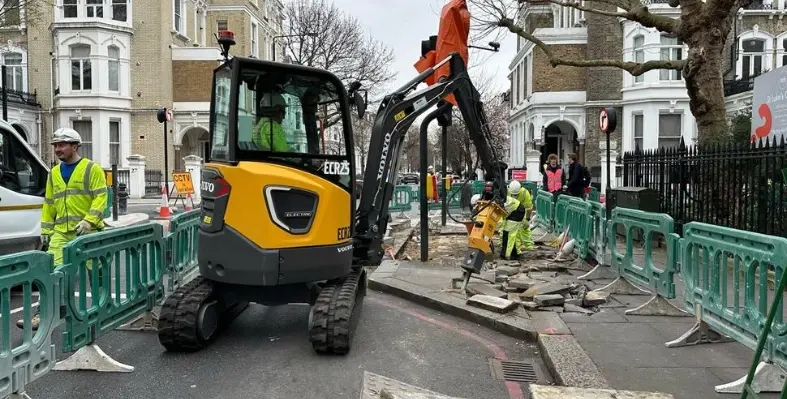A high-level roundtable held at the Swedish Embassy during London Climate Action Week has spotlighted the outsized role diesel compact construction machines play in worsening urban air quality, and the urgent need for policy and industry to drive the shift to electric alternatives.
The event brought together city officials, construction leaders and researchers to tackle the overlooked issue of diesel compact machinery, which remains largely exempt from regulations such as London’s Ultra Low Emission Zone (ULEZ) despite emitting significant levels of nitrogen oxides (NOx) and particulate matter (PM). Representatives from Volvo Construction Equipment (Volvo CE), the City of London, and campaign groups joined the call for a rapid transition to zero-emission equipment.
In London alone, approximately 5,000 diesel compact excavators currently in use generate as much NOx and PM as more than 100,000 diesel cars. Yet, because they are not required to meet the same particulate filtration standards as passenger vehicles or larger machines, their impact often goes unaddressed.
With construction now the dominant source of black carbon emissions in London, overtaking cars, the urgency is clear. Globally, only 17% of cities meet WHO air quality guidelines, and air pollution contributed to 8.1 million premature deaths in 2021 alone.
Low-emission equipment
The roundtable also showcased findings from a 12-week trial by Volvo CE, Transport for London (TfL), and FM Conway, which replaced diesel equipment with three electric construction machines. The result: nearly 8kg of harmful NOx and hydrocarbon emissions were avoided, which is the equivalent of a diesel car travelling more than 39,000 miles.
Advocates say electric alternatives offer a win-win: quieter operation, lower vibration, zero tailpipe emissions, and less energy waste, making them ideal for densely populated urban areas. But challenges remain: lack of charging infrastructure, green energy access, regulatory gaps and high upfront costs.
As cities look to scale climate and public health efforts, roundtable participants called for collaborative action to overcome these barriers. Embedding sustainability criteria into public tenders, expanding low emission zones to include all construction machinery, and increasing awareness of compact diesel machines’ impact were highlighted as immediate priorities.
The event closed with a strong message: cleaning up construction emissions is not only technically viable but essential to creating healthier cities. With bold leadership, coordinated policy, and cross-industry collaboration, electric construction machines could play a pivotal role in transforming the urban environment.
Thomas Bitter, Head of the Compact Business Unit at Volvo CE, said, “Cities like London are making great progress to improve air quality. But ignoring construction equipment in low emission policies misses a key health opportunity. Zero-emission solutions exist, but adoption is too slow. We need full value chain collaboration to break down barriers to change and speed up the shift to emission-free construction that is so essential for urban health.”
Also read: Volvo CE excavators undergo rigorous testing; outperform rivals









